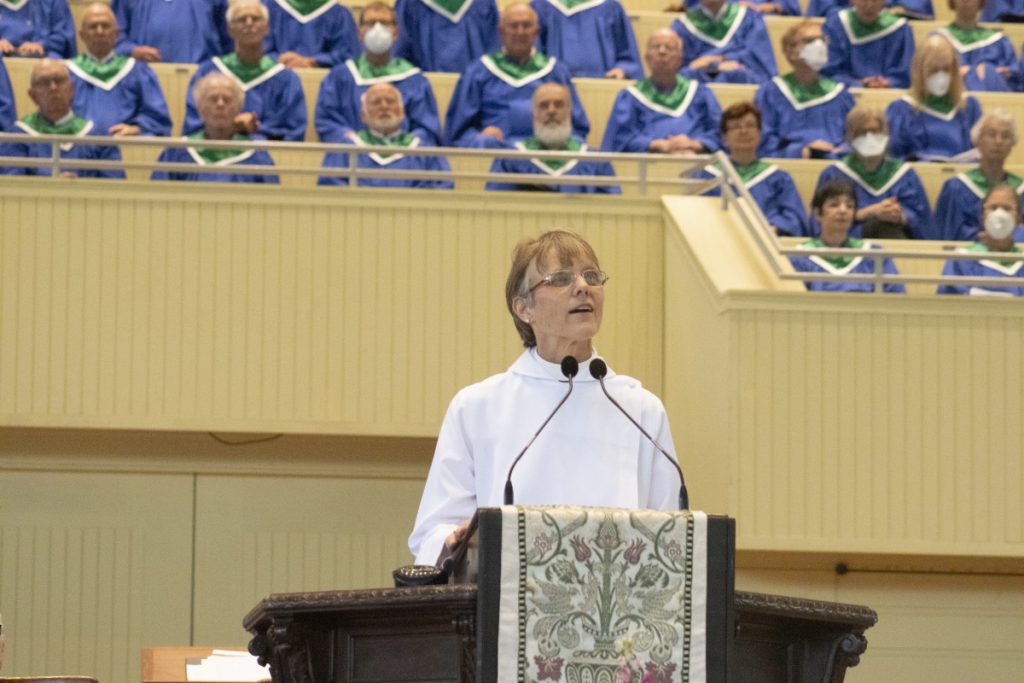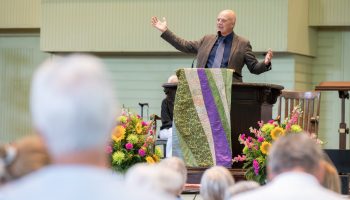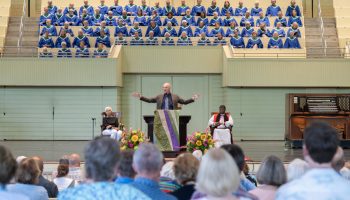“The most difficult decision we have to make is to accept what we do not choose,” said the Rt. Rev. Mariann Edgar Budde at the 9:15 a.m. Thursday, June 30, ecumenical morning worship in the Amphitheater. “As Howard Thurman said, we have to accept our fate as our destiny.”
Budde’s sermon title was “Accepting What We Do Not Choose.” The Scripture texts were Romans 5:1-5 and 2 Corinthians 12:7-10.
Jack was the partner of Budde’s sister Christine. He was diagnosed with stage 4 lung cancer and the prognosis was not great. He began chemotherapy and experienced awful side effects. Christine’s life narrowed from volunteer activities, taking care of grandchildren and helping Jack in his business, to just taking care of Jack.
One day she told Budde, “I now know every corner of this hospital complex. It was not what I planned for 2019, but it was what God had in mind.”
“This was her way of expressing how to come to terms with the awful situation,” Budde said, “to try to find God somewhere.”
Kate Bowler, assistant professor of American religious history at Duke Divinity School, said there are some lies people lean on to express hope when faced with the worst. People hope that the worst is part of a larger plan and not the worst thing possible.

Jack went into remission and was told to pursue his bucket list. But the tumors returned and he needed daily radiation. Christine was trying not to show her anger with the doctors who would not give up, but she knew that Jack would not give up until the doctors did. When the doctors told Jack there was nothing more they could do, he died the next day.
“The only thing in Christine’s control was how to respond to the situation. She chose love. Accepting what we don’t choose is the path of courage,” Budde said.
Denial is the first response to disaster.
“When the facts persist, we overlook the outcome we dread. Even in the Serenity Prayer, we first have to change the things we can before we accept what we cannot change,” Budde said. “Acceptance is not the same as passivity. Acceptance means we are actively engaged with what faces us.”
Budde was on a plane that hit a lot of turbulence.
The pilot came on and said, “Folks, we have hit a rough patch and there is no getting around it. The only way is through.”
“This is making peace with suffering,” Budde said.
For the apostle Paul, the price for his suffering was solidarity with Christ. It was a price he was glad to pay because he saw it as a path of transformation.
“Only once did Paul offer a glimpse of his inner struggle. He never disclosed what the thorn in his side was, but it was a constant companion. His prayer to have it removed was answered with sufficient grace to take it in,” Budde said. “Paul prayed three times for the thorn to be removed, but it was not. Where else can we turn but acceptance? That acceptance doesn’t come easily to me. I am willful, like to fix things, and I don’t let go of control without a fight.”
Budde suffers from chronic pain that began in her ankle and then settled into her lower back.
“I can’t sit for long, and I learned how excruciating chronic pain is,” Budde said. “My mother, who is a physical therapist, told me that my back was not supposed to hurt. Thanks, Mom.”
She tried chiropractors and Rolfing, which she described as “being known for discomfort and expense.” The Rolfing practitioner told her that her brain was caught in a pain loop and to tell it that nothing was wrong. Nothing made the pain go away, but Budde found relief in exercise, mediation and chiropractic treatments.
“First I had to accept that the pain was not going away. One of the chiropractors told me, ‘This is a condition that will make you healthier if you tend to the weakness and surround it with strength. So, you will live a long, healthy life,’ ” she said.
By not fighting her body, she freed her brain. It was liberating and she was able to feel empathy for others.
“Maybe this is what the Rolfing practitioner meant; telling someone that everything happens for a reason is like pouring salt on a wound,” Budde said. “Our only response to a person in pain is to be an empathetic presence. We are left to find the meaning, and it is ours to find.”
When there is no way out, it can be comforting and emboldening to speak with begrudging gratitude.
“As a friend said, ‘I am not grateful that it happened, but I am grateful for the person I have become,’ ” Budde said.
There is mystery in acceptance that becomes a transformative power in people’s lives. It is possible to find meaning in adversity, even if we want to avoid suffering.
Martin Luther King Jr. practiced redemptive suffering to accept suffering for the sake of others. King suffered death threats, being jailed in Alabama, having his home bombed, and a stabbing that could have killed him. He said that there were two ways to respond — bitterness, or transforming the suffering into a creative force. He tried to make a virtue of a way of life.
“His decision to return to Memphis to help the sanitation workers’ strike was like the parable of the Good Samaritan. One man stopped and offered dangerous unselfishness,” Budde said. “The priest and the Levite asked ‘If I stop, what will happen to me?’ The Samaritan asked ‘If I don’t stop what will happen to the man?’ The Samaritan asks what will happen to them; the price is high but provides a way forward.”
In J.R.R. Tolkien’s “Lord of the Rings” trilogy, the wizard Gandalf tells Frodo that the ring came to him for a reason. Frodo wishes that event had never happened. Gandalf replies, “So do all who live to see such times.” But we choose how to respond.
“I will take the ring, but I don’t know the way,” Frodo answers him. Gandalf reminds him, “There are other forces at work besides the will of people,” Budde said.
“Don’t worry if you don’t get it right, there are other forces at work,” she said. “With God, we are all in, and our capacity for love will grow. We were surely called for this. Now go, talk among yourselves, share your stories and savor the goodness of the day.”
The Rev. George Wirth, retired senior minister of First Presbyterian Church, Atlanta, served as liturgist. Paul Burkhart, a member of the Motet Choir since 1971, read the Scripture lessons. For the prelude, the Motet Consort played “Trio Sonata in D: Allegro Molto,” by C.P.E. Bach The consort included Willie LaFavor on piano, Barbara Hois on flute and Deborah Grohman on clarinet. The anthem, sung by the Motet Choir, was “When I Survey the Wondrous Cross,” text by Isaac Watts and music by Gilbert M. Martin. Joshua Stafford, director of sacred music and holder of the Jared Jacobsen Chair for the Organ, conducted the choir, and Nicholas Stigall, organ scholar, provided the accompaniment. Stigall played the postlude, “Fanfare on Lyons,” by Raymond H. Haan. Support for this week’s services is provided by the Samuel M. and Mary E. Hazlett Memorial Fund.




